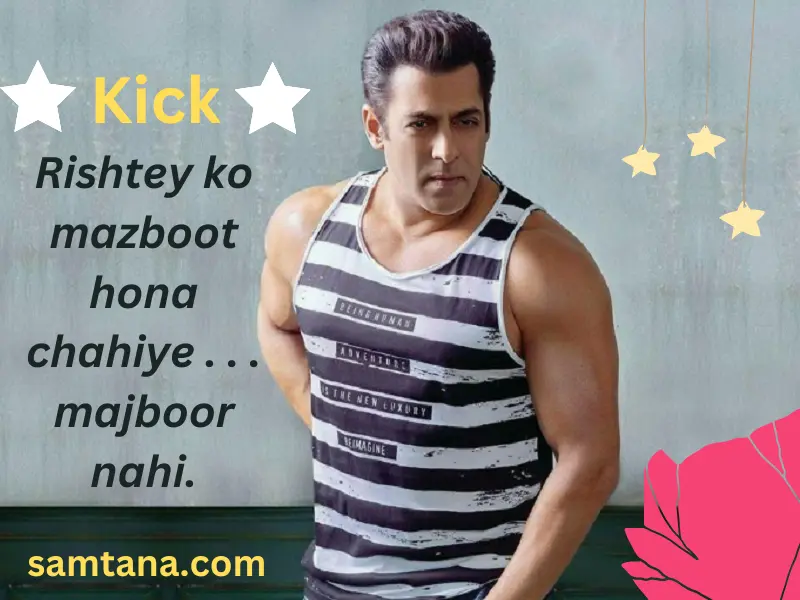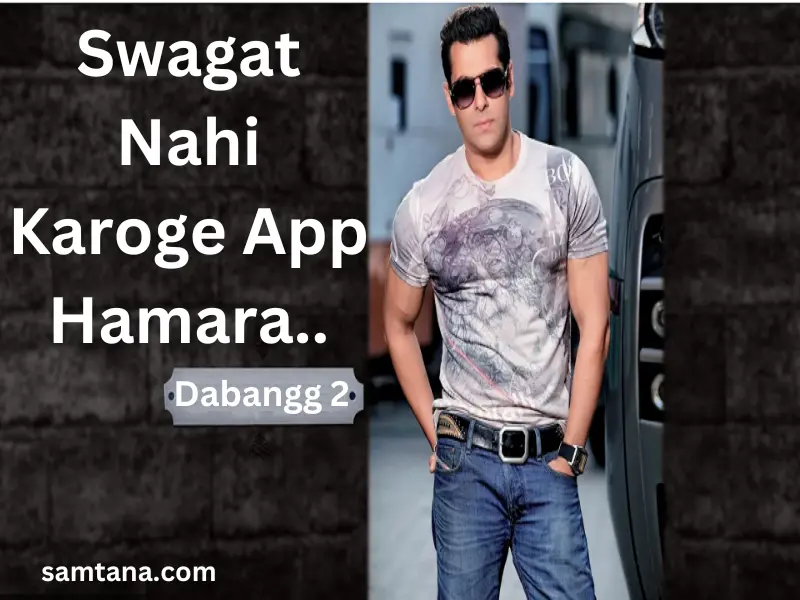Salman Khan, often known as the “Bhai” of Bollywood, has enthralled audiences with his charismatic personality and powerful dialogues. Over the years, he has delivered numerous memorable lines that have become iconic in the realm of Hindi cinema. From romantic to action-packed movies, Salman Khan has showcased his versatility as an actor through his dialogue delivery. In this article, we will explore some of the best Salman Khan dialogues from Bollywood films, which have left an indelible mark on the hearts of millions.

Introduction
Salman Khan, born on December 27, 1965, in Indore, Madhya Pradesh, is one of the most celebrated actors in the Indian film industry. He made his debut in 1989 with the film “Maine Pyar Kiya,” which went on to become a massive success and established him as a leading actor. Salman Khan’s movies are known for their high-octane action sequences, heartfelt emotions, and catchy dialogues that resonate with the audience.
“Maine Pyar Kiya” (1989)
Dialogue 1: “Dosti ka ek usool hai madam, no sorry, no thank you.”
This dialogue captures the essence of friendship and loyalty. Salman Khan, playing the character of Prem, emphasizes the importance of genuine friendship, where apologies and formalities hold no place. It became an instant hit and is still remembered fondly by fans.
Dialogue 2: “Ek ladka aur ladki kabhi dost nahi ho sakte.”
In this dialogue, Salman Khan’s character challenges the popular notion that a boy and a girl can never be friends. The line showcases his conviction and belief in the purity of relationships, striking a chord with the audience.
Dialogue 3: “Dosti ka ek oosul hai, no sorry, no thank you.”
Similar to the first dialogue, this line reiterates the notion that true friendship should be devoid of formalities like apologies and gratitude. It underscores the simplicity and authenticity of relationships, leaving a lasting impact on the viewers.
“Wanted” (2009)
Dialogue 1: “Ek baar jo maine commitment kar di, toh phir main apne aap ki bhi nahi sunta.”
This dialogue showcases Salman Khan’s character, Radhe, as a man of his word. It reflects his unwavering determination and commitment to fulfill the promises he makes, highlighting his strong personality.
Dialogue 2: “Main dil mein aata hoon, samajh mein nahi.”
With this dialogue, Salman Khan beautifully portrays the enigmatic nature of his character. It suggests that he may be difficult to understand, but his actions are driven by his heart, making him a complex yet intriguing persona.
“Dabangg” (2010)
Dialogue 1: “Swagat nahi karoge aap hamara?”
This dialogue, spoken by Salman Khan’s character Chulbul Pandey, became synonymous with his on-screen persona. It reflects his swagger and confidence, as he invites others to embrace his larger-than-life presence.
Dialogue 2: “Hum tum mein itne ched karenge, ki confuse ho jaoge ki saans kahan se le aur paadein kahan se.”
This quirky and witty dialogue showcases Chulbul Pandey’s mischievous side. It demonstrates Salman Khan’s ability to infuse humor into his dialogues, creating an entertaining and memorable experience for the audience.
“Bajrangi Bhaijaan” (2015)
Dialogue 1: “Mujhe ghar jaana hai.”
In this heartfelt dialogue, Salman Khan’s character, Pawan Kumar Chaturvedi, expresses his earnest desire to return home. The simplicity and innocence in his voice touch the hearts of the viewers, making it an emotional and powerful moment in the film.
Dialogue 2: “Selfish hote hai, lekin itna selfish?”
This dialogue captures the essence of selflessness and compassion. Salman Khan questions the societal definition of selfishness, emphasizing that true acts of kindness go beyond personal gains.
“Sultan” (2016)
Dialogue 1: “Wrestling is not a sport, it’s about fighting what lies within.”
In the movie “Sultan,” Salman Khan portrays the character of a wrestler who faces internal struggles and obstacles. This dialogue reflects the deeper meaning behind the sport and highlights the importance of battling one’s inner demons to emerge victorious.
Dialogue 2: “Jisse main sirf apne seene se lagana chahta hoon, woh Sultan hai.”
This powerful dialogue showcases Salman Khan’s character’s determination and pride. It encapsulates the essence of his journey from a common man to a revered wrestler, evoking a sense of inspiration and admiration.
“Tiger Zinda Hai” (2017)
Dialogue 1: “Zoya, hum aapke saath hain. Aur humesha aapke saath rahenge.”
In this dialogue, Salman Khan’s character, Tiger, reassures his partner, Zoya, of his unwavering support and presence. It portrays his loyalty and dedication, emphasizing the importance of standing by loved ones in times of need.
Dialogue 2: “Kya tumhe yakeen hai?”
This dialogue conveys a sense of urgency and determination as Salman Khan’s character questions Zoya’s belief in their abilities. It adds depth to their mission and adds an element of suspense and anticipation.

“Bharat” (2019)
Dialogue 1: “Jawaani humari jaaneman thi, aur yeh bhi ek pal ki baat hai.”
This dialogue reflects upon the fleeting nature of youth and life itself. Salman Khan’s character, Bharat, reminisces about the joys and adventures of his younger days, capturing the essence of nostalgia and the passage of time.
Dialogue 2: “Dil mein aata hoon, samajh mein nahi.”
Similar to the dialogue from “Wanted,” this line showcases Bharat’s complex personality. It suggests that his emotions and actions may not always be understood by others, adding depth and intrigue to his character.
“Radhe” (2021)
Dialogue 1: “Swag ke liye kuch bhi karega.”
This dialogue encapsulates the essence of Salman Khan’s on-screen persona. It highlights his charisma, style, and larger-than-life presence, resonating with his fans who admire his swag and attitude.
Dialogue 2: “Ek baar jo maine commitment kar di, phir main apne aap ki bhi nahi sunta.”
Similar to the dialogue from “Wanted,” this line emphasizes the unwavering commitment and determination of Salman Khan’s character, Radhe. It showcases his strong sense of responsibility and dedication to his mission.
Conclusion
Salman Khan’s dialogues have become an integral part of Bollywood’s legacy. From romantic dialogues to powerful one-liners, his delivery and charisma have made them truly unforgettable. Whether it’s the emotional depth of “Bajrangi Bhaijaan” or the swagger of “Dabangg,” Salman Khan has left an indelible mark on the audience through his dialogues. His unique style, combined with his on-screen presence, has made him a beloved figure in Indian cinema.
FAQs
- What are some iconic dialogues of Salman Khan?
- Some iconic dialogues of Salman Khan include “Ek baar jo maine commitment kar di, toh phir main apne aap ki bhi nahi sunta” from “Wanted” and “Swagat nahi karoge aap hamara?” from “Dabangg.”
- How has Salman Khan’s dialogue delivery evolved over the years?
- Salman Khan’s dialogue delivery has evolved from romantic and poetic lines to more dynamic and impactful dialogues. He has embraced different genres and adapted his delivery style accordingly.
- Which movie of Salman Khan has the most memorable dialogues?
- It is subjective, as different movies have different memorable dialogues. However, “Wanted,” “Dabangg,” and “Bajrangi Bhaijaan” are often cited as having some of Salman Khan’s most memorable dialogues.
- Are Salman Khan’s dialogues relatable to the audience?
- Yes, Salman Khan’s dialogues often resonate with the audience. Whether it’s his romantic lines or his energetic one-liners, his dialogues strike a chord with fans and become memorable catchphrases.
- How do Salman Khan’s dialogues contribute to his on-screen persona?
- Salman Khan’s dialogues play a crucial role in shaping his on-screen persona. They add depth, charm, and a unique flavor to his characters, making them more relatable and memorable to the audience.

